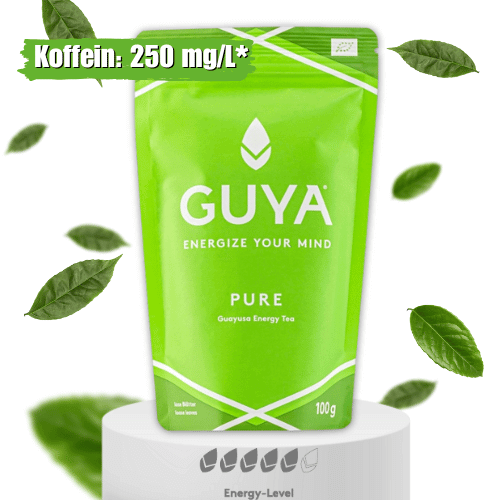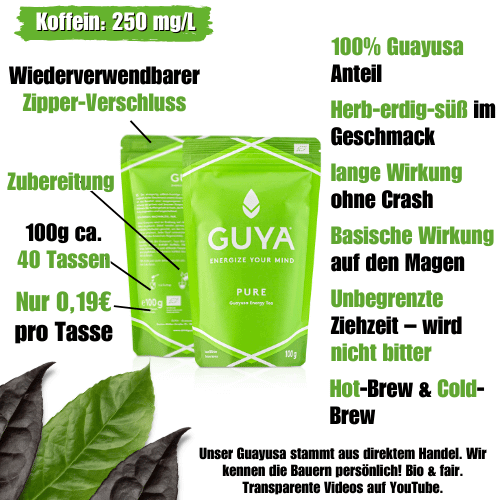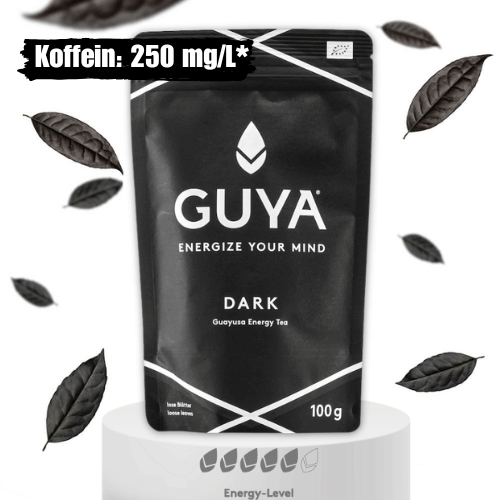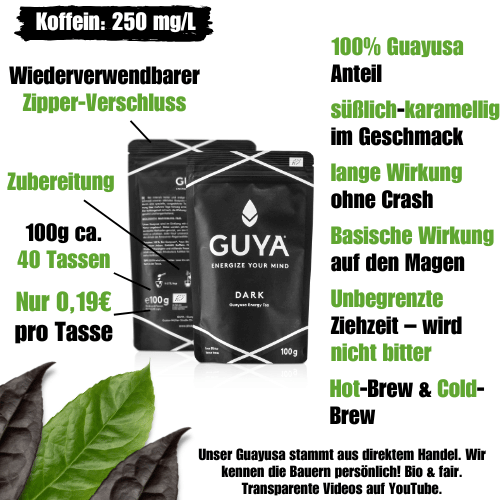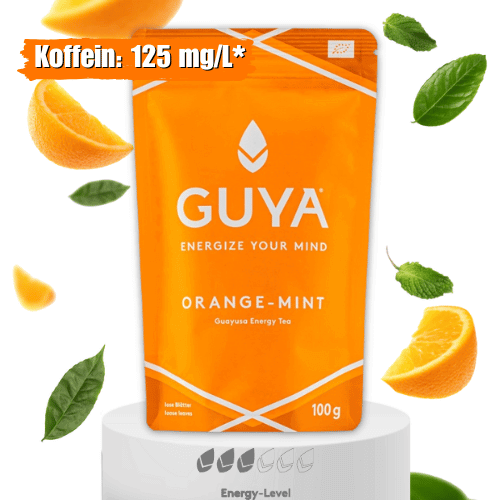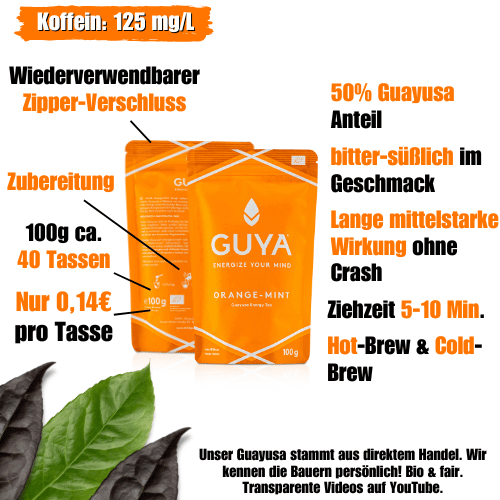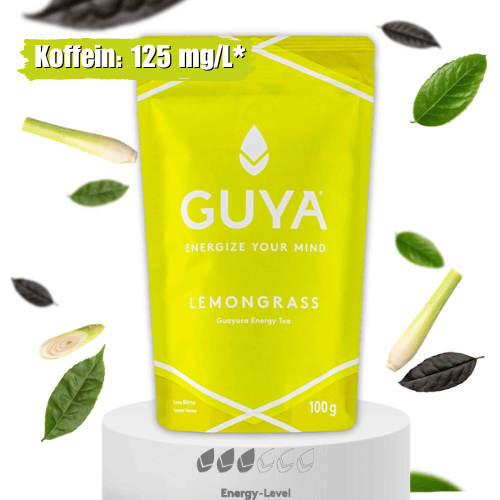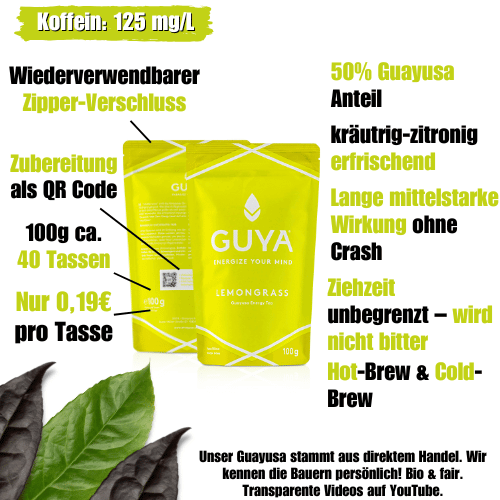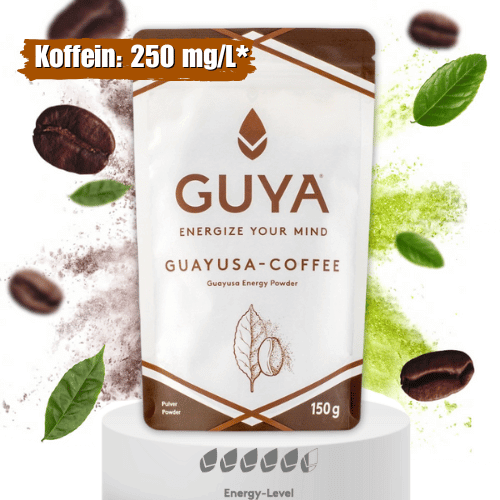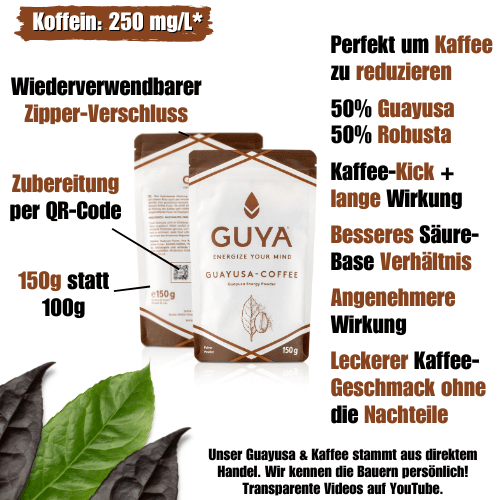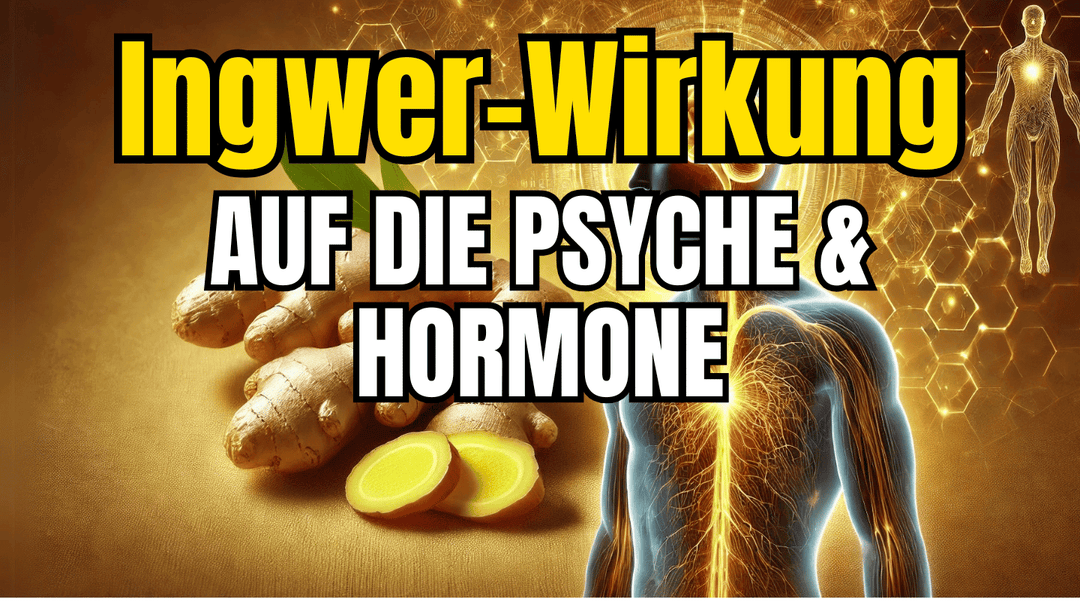What are antioxidants? - Guayusa, the “Orac” miracle!
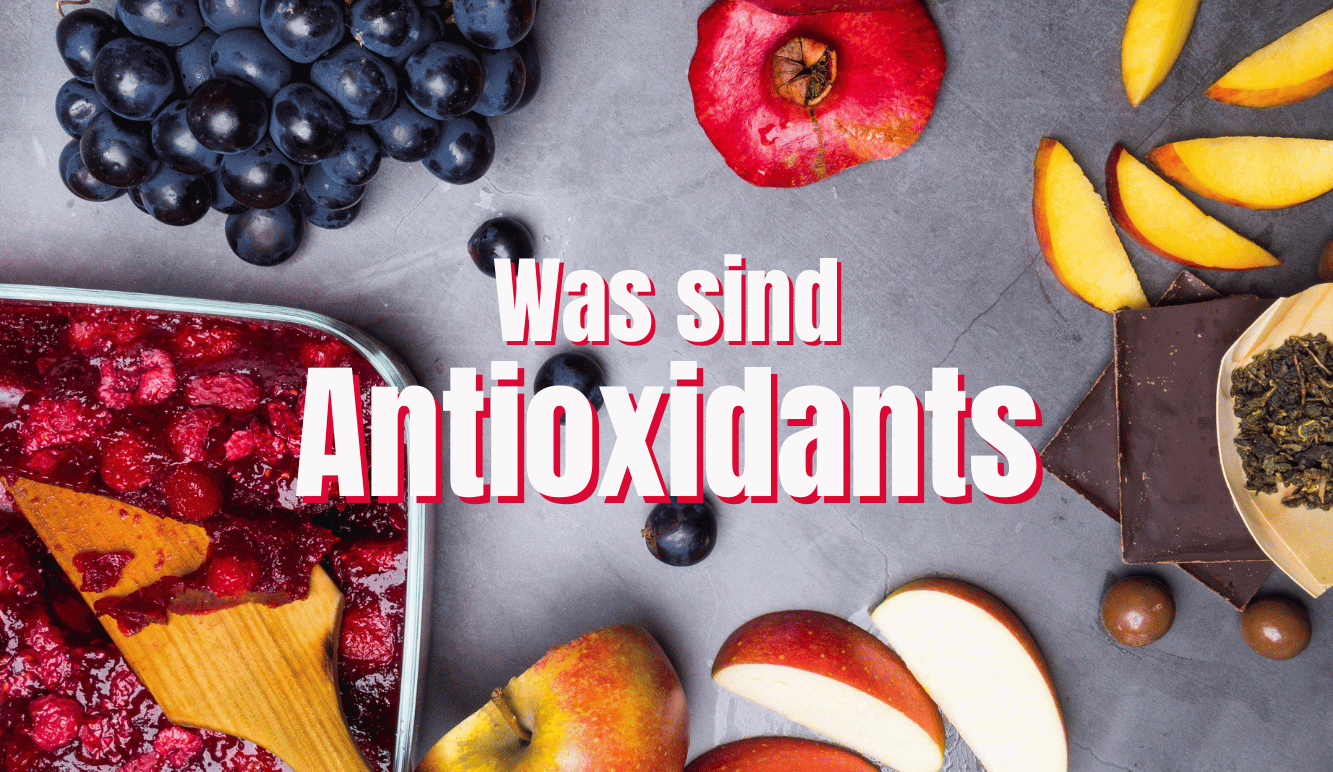
Introduction
Discover the extraordinary properties of antioxidants and plants like them Guayusa with amazing ORAC values. Antioxidants are essential molecules that can protect our cells from harmful free radicals.
In this article we will delve deeper into this exciting topic. You will learn how antioxidants can support our health and protect against oxidative stress. We will explain the importance of the ORAC value as a measure of the antioxidant capacity of foods and why Guayusa so remarkable as a natural source of antioxidants. Find out how you can benefit from the health benefits and what effects antioxidants can have on our health.
Table of contents
- Summary
- What exactly are antioxidants?
- How do antioxidants work?
- The role of antioxidants in our body
- The sources of antioxidants
- Guayusa: A special source of antioxidants
- The ORAC value
- Comparison of the ORAC value of different foods
- Health Benefits of Antioxidants
- Current research on antioxidants
- Conclusion
- FAQ
Summary
- Antioxidants are substances found in many foods that help fight harmful free radicals in the body.
- Free radicals arise as byproducts of metabolism and can lead to cell damage, which is linked to various diseases.
- Antioxidants neutralize free radicals, helping to prevent cell damage and promote health.
- A balanced diet with a wide range of fresh fruits, vegetables, whole grains and superfoods such as Guayusa provides a variety of antioxidants.
- Guayusa is an exceptional source of antioxidants with a high ORAC value, which highlights its antioxidant properties.
1. What exactly are antioxidants?
Antioxidants are molecules that are able to inhibit or prevent the oxidation of other molecules. Oxidation is a chemical reaction that can produce free radicals. Free radicals can start chain reactions that eventually lead to Damage or death of cells being able to lead.
Oxidative stress occurs when there is an imbalance between the production of free radicals and the body's ability to neutralize or repair their harmful effects. This imbalance can lead to various things health problems including inflammation, aging and diseases such as cancer, heart disease and neurodegenerative disorders such as Alzheimer's.
Antioxidants, either produced by the body or obtained through diet, play a crucial role in defending against these harmful processes. They do this by "intercepting" and neutralizing the free radicals before they can cause damage.
There are a variety of different antioxidants, each with their own specific functions and mechanisms. These include vitamins (such as vitamins C and E), minerals (such as selenium), enzymes (such as superoxide dismutase, catalase, glutathione peroxidase) and botanicals (such as flavonoids, phenols and polyphenols).
It is important to note that not all antioxidants are created equal. Each antioxidant has its own specific function and can work in specific types of cells or tissues. Therefore, a diverse diet that provides a wide range of foods is essential for optimal health.
How exactly do antioxidants work?
They work by neutralizing free radicals. Free radicals are highly reactive molecules with unpaired electrons that can have harmful effects on our cells and tissues. They can be caused by various processes and reactions in the body as well as by environmental factors such as UV light, pollution and cigarette smoke arise.
Free radicals can cause cell damage by attacking cell membranes, oxidizing proteins and lipids, and even causing DNA changes. Over time, such damage can lead to chronic inflammation and various diseases including Heart disease, diabetes, cancer and neurodegenerative diseases, lead.
Antioxidants neutralize free radicals by “donating” one or more of their electrons. This neutralizes the free radical and prevents it from causing further damage. Some antioxidants can even help repair damage that has already occurred.
Our body needs both endogenous (produced in the body) and exogenous (supplied through diet) antioxidants. While our body can produce its own antioxidants, it also relies on dietary intake of antioxidants, especially those that it cannot produce on its own, such as Vitamin C and E.
For this reason, a balanced, nutrient-dense diet that includes a variety of antioxidant foods is critical to maintaining health and preventing disease.
The role of antioxidants in our body
Antioxidants play a crucial role in our body by protecting us from the damaging effects of oxidative stress and free radicals. They will therefore also be in Supplements and Nootropics like from the company NutriBrain used.
One could compare their role in our body to that of a guardian. The free radicals could be viewed as invaders trying to cause damage. The Guardians are constantly on guard, ready to ward off these intruders and prevent any damage.
They intercept free radicals and neutralize them before they can damage cells and tissue. In doing so, they protect us from oxidative stress and support our general health and well-being.
The sources of antioxidants
Antioxidants are found in a variety of sources, especially our food. They are found in many fruits and vegetables, nuts, seeds and spices. Antioxidants are also present in some drinks, such as tea and coffee.
Foods with a particularly high content include:
- dark berries such as blueberries, raspberries and strawberries,
- green leafy vegetables like spinach and kale, and
- Spices like turmeric and ginger as well
- Nuts and seeds, such as walnuts and flaxseeds.
However, there isn't just one type of antioxidant. Different foods contain different species, each of which works in different ways. Vitamin C and E, beta-carotene and selenium are just a few of the many types found in our food.
This is what makes a varied and balanced diet so important. By consuming a wide range of nutrient-dense foods, we ensure that our body receives the different types of antioxidants it needs to function optimally.
Guayusa: A special source of antioxidants
Among the diverse sources of antioxidants, there are a few that stand out. One such example is Guayusa, a plant native to South America known for its high content. Guayusa Native to the rainforests of Ecuador, it has been valued by indigenous communities for centuries for its amazing health benefits.
The special thing about Guayusa is not just the amount of antioxidants it contains, but also the variety. Guayusa is rich in polyphenols, which are known for their health benefits, including their ability to reduce inflammation and support the cardiovascular system. Lutein is also an antioxidant that can improve the retina's absorption of blue light. Lutein is available in addition to the 100% natural version Guayusa-Tea also as Single active ingredient in supplement form on Amazon.
Guayusa also contains caffeine, making it an excellent alternative to traditional tea or coffee. However, unlike coffee or black tea, it delivers Guayusa a "clean" caffeine that provides a smooth, lasting energy boost, without the unwanted ones Side effects such as nervousness or sleep disorders. The Effect of Guayusa is described as a state of relaxed alertness.
But that is not all. Guayusa is also rich in L-theanine, an amino acid known to improve mental clarity and focus. The combination of caffeine and L-theanine in Guayusa provides balanced, focused energy - ideal for a productive day.
Although Guayusa is not yet as well known as other superfoods, it is quickly gaining popularity thanks to its impressive nutrient density and its health benefits.
The ORAC value
When we talk about antioxidants, one cannot help but mention the ORAC value. ORAC stands for “Oxygen Radical Absorbance Capacity”. It is a method developed to measure the antioxidant capacity of different foods.
The ORAC value indicates how well a food or substance can neutralize free radicals. The higher the ORAC value, the greater the antioxidant capacity. A high ORAC value in a food or drink means that it has a strong ability to neutralize the harmful free radicals that can damage our bodies.
Understanding the ORAC value can help us make more informed decisions about our diet. When it comes to protecting our body from the harmful effects of free radicals, the ORAC value is an important factor to take into account.
Comparison of the ORAC value of different foods
To give you a better idea of how exceptional the ORAC value of Guayusa Here we compare it with that of other common foods, snacks and drinks:
|
Antioxidant capacity of various foods (ORAC)11,12 |
|||||
|
Main food |
Snacks |
beverages |
|||
| Broccoli | 1352 µmol TE/100g | dark chocolate | 39900 µmol TE/100g | Guayusa | 127,000 µmol TE/100g |
| potatoes | 1098 µmol TE/100g | banana | 879 µmol TE/100g | Green tea | 62,000 µmol TE/100g |
| Beans | 9459 µmol TE/100g | Apple | 2670 µmol TE/100g | Coffee | 8,000 µmol TE/100g |
| tomato | 694 µmol TE/100g | mango | 1002 µmol TE/100g | Apple juice | 6681 µmol TE/100g |
| Cabbage | 508 µmol TE/100g | hazelnuts | 9645 µmol TE/100g | orange juice | 726 µmol TE/100g |
| Carrots | 666 µmol TE/100g | Cherries | 3365 µmol TE/100g | Pomegranate juice | 1788 µmol TE/100g |
| Onions | 863 µmol TE/100g | Dates | 3895 µmol TE/100g | lemon juice | 1225 µmol TE/100g |
| spinach | 1515 µmol TE/100g | kiwi | 882 µmol TE/100g | grape seed flour | 100,000 µmol TE/100g |
| Olives | 684 µmol TE/100g | ||||
As you can see, it stings Guayusa with a ORAC value of 127,000 µmol TE/100g clearly visible.
Health Benefits of Antioxidants
Antioxidants are essential for our well-being. They offer many health benefits including:
- Immune system support: They help strengthen the immune system and fight off infections and diseases.
- Protection against cell damage: They neutralize harmful free radicals that could otherwise damage cells and cause diseases such as heart disease and cancer.
- Delaying the aging process: By protecting against cell damage, antioxidants can slow the aging process and contribute to skin health.
- Preventing Inflammation: Some antioxidants have anti-inflammatory properties that can help reduce chronic inflammation.
- Protecting the brain and improving cognitive function: They can support brain health and reduce the risk of neurodegenerative diseases such as Alzheimer's and Parkinson's.
A healthy and balanced diet is the best source of antioxidants. Adding special foods, such as Guayusa, can also give an extra boost.

Current research on antioxidants
Research into antioxidants and their health effects is a constantly evolving field. While we already know about the numerous benefits, new and exciting discoveries continue to emerge. Some current research areas include:
- The effect of antioxidants on the human immune system: Current research suggests that antioxidants may play a key role in the health of our immune system.
- Antioxidants and cardiovascular disease: There is evidence that antioxidants may reduce the risk of certain cardiovascular diseases, although further research is still needed to fully understand these links.
- Antioxidants and aging processes: Some studies suggest they may help slow certain signs of the aging process.
Conclusion
Antioxidants play an important role in our health as they help prevent cell damage and protect the body from the harmful effects of free radicals. A balanced diet can help reduce inflammation, strengthen the immune system and reduce the risk of chronic diseases. Guayusa is a remarkable source of antioxidants and offers a natural way to supply the body with these valuable substances.
FAQ
1. Why are antioxidants important for health?
Antioxidants are important because they can fight free radicals and prevent cell damage, which is linked to a variety of diseases.2. Which foods are rich in antioxidants?
Foods like berries, dark chocolate, green leafy vegetables, nuts and Guayusa are rich in antioxidants.3. How do antioxidants work in the body?
Antioxidants neutralize free radicals by giving them electrons and can thus prevent cell damage.4. Are there any health benefits from taking antioxidants?
Yes, antioxidants can reduce inflammation, boost the immune system, and reduce the risk of chronic disease.5. Is Guayusa a good source of antioxidants?
Yes, Guayusa is a remarkable source of antioxidants with a high ORAC value that highlights its antioxidant properties.



